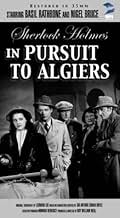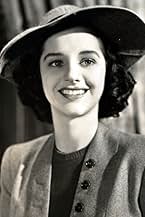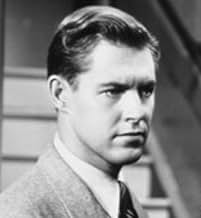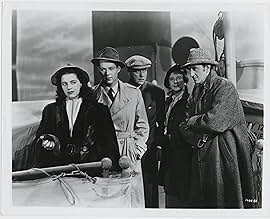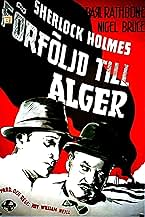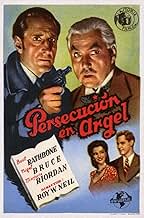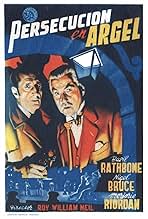IMDb रेटिंग
6.7/10
4.4 हज़ार
आपकी रेटिंग
अपनी भाषा में प्लॉट जोड़ेंHolmes is recruited to escort the heir to a European throne safely back to his homeland after his father's assassination.Holmes is recruited to escort the heir to a European throne safely back to his homeland after his father's assassination.Holmes is recruited to escort the heir to a European throne safely back to his homeland after his father's assassination.
- निर्देशक
- लेखक
- स्टार
William 'Wee Willie' Davis
- Gubec
- (as Wee Willie Davis)
Frederick Worlock
- Prime Minister
- (as Frederic Worlock)
Wilson Benge
- Clergyman
- (बिना क्रेडिट के)
Sven Hugo Borg
- Johansson
- (बिना क्रेडिट के)
Ernst Brengt
- Ship Passenger
- (बिना क्रेडिट के)
James Carlisle
- Aide
- (बिना क्रेडिट के)
Ashley Cowan
- Steward
- (बिना क्रेडिट के)
James Craven
- Anton Petzval
- (बिना क्रेडिट के)
फ़ीचर्ड समीक्षाएं
The Sherlock Holmes Series is actually fun for the fans of Basil Rathbone and Nigel Bruce, but the individual films are a mixed bag as mysteries themselves. The best mysteries are THE SCARLET CLAW, THE HOUSE OF FEAR, THE ADVENTURES OF SHERLOCK HOLMES, THE HOUND OF THE BASKERVILLES, SHERLOCK HOLMES FACES DEATH. The ones about the war are mediocre - more like curiosities dealing with patriotism and the war effort. After the war the series resumed plots dealing with regular crime. The best of these was THE PEARL OF DEATH, but it was not up to the top five films. One of the final films was this one, PURSUIT TO ALGIERS.
Although all the other films were rewritten from the original Conan Doyle stories, PURSUIT TO ALGIERS was totally made up from a comment dropped in the original "Canon". Doyle wrote four novels and fifty six short stories about Holmes. But in this material (equal in size to say LES MISERABLES or DON QUIXOTE) were many little comments and statements that actually have helped lead to the myriad of essays and books by Holmes' fans. Among other things are the large number of cases of Holmes that he or Watson mention casually, but never write of. In this film, the untold story is "the affair of the steamship "Friesland" that so nearly cost us both our lives". It is mentioned in one of the stories of the series called THE RETURN OF SHERLOCK HOLMES, and is usually said to be set in 1895. The actions of PURSUIT TO ALGIERS take place on the steamship "Friesland", and do almost cost Holmes and Watson their lives, but this film is set after the end of World War II. Since there was no real short story that is nothing to be critical about.
Holmes is not in part of the film (and at one point it seems he has been killed), but he does appear about the middle, and he is in good form when he is. Witness the way he takes care of Martin Kosleck, and the way he makes a typically ironic comment to Kosleck as to why he was able to be prepared. Also the business about party favors is quite nicely done. So are the supporting parts - especially Bruce's comments regarding Rosalind Ivan and John Abbott and his partner. As an entertainment it is a fine film. As a mystery it really never gets very involving. We never understand who is in the background backing the anti-royal assassins. Presumably the Communists (this is 1945), but such a guess is based on the number of Eastern European monarchies that fell following the end of World War II. Still it would help to know who the super-villain is. But then Hitchcock always ignored the central rationales of his "MacGuffins". Why not on this lesser level then? So forget the pleasure of realism, sit back, and just enjoy the antics of the characters. And keep in mind, Basil and Nigel made only two other of these films afterward. It was nearly the end of the series for them and their fans.
Although all the other films were rewritten from the original Conan Doyle stories, PURSUIT TO ALGIERS was totally made up from a comment dropped in the original "Canon". Doyle wrote four novels and fifty six short stories about Holmes. But in this material (equal in size to say LES MISERABLES or DON QUIXOTE) were many little comments and statements that actually have helped lead to the myriad of essays and books by Holmes' fans. Among other things are the large number of cases of Holmes that he or Watson mention casually, but never write of. In this film, the untold story is "the affair of the steamship "Friesland" that so nearly cost us both our lives". It is mentioned in one of the stories of the series called THE RETURN OF SHERLOCK HOLMES, and is usually said to be set in 1895. The actions of PURSUIT TO ALGIERS take place on the steamship "Friesland", and do almost cost Holmes and Watson their lives, but this film is set after the end of World War II. Since there was no real short story that is nothing to be critical about.
Holmes is not in part of the film (and at one point it seems he has been killed), but he does appear about the middle, and he is in good form when he is. Witness the way he takes care of Martin Kosleck, and the way he makes a typically ironic comment to Kosleck as to why he was able to be prepared. Also the business about party favors is quite nicely done. So are the supporting parts - especially Bruce's comments regarding Rosalind Ivan and John Abbott and his partner. As an entertainment it is a fine film. As a mystery it really never gets very involving. We never understand who is in the background backing the anti-royal assassins. Presumably the Communists (this is 1945), but such a guess is based on the number of Eastern European monarchies that fell following the end of World War II. Still it would help to know who the super-villain is. But then Hitchcock always ignored the central rationales of his "MacGuffins". Why not on this lesser level then? So forget the pleasure of realism, sit back, and just enjoy the antics of the characters. And keep in mind, Basil and Nigel made only two other of these films afterward. It was nearly the end of the series for them and their fans.
The definitive movie Sherlock Holmes is Basil Rathbone; the definitive movie Dr. Watson is Nigel Bruce. Together, these two brilliant actors made fourteen Sherlock Holmes films between 1939 and 1946, most of them loosely based on stories by Arthur Conan Doyle; a few based on Doyle stories in name only. All are thrilling, exciting excursions into the realm of mystery and deductive reasoning, even the later low-budget ones.
The original pairing of the super sleuth with his bumbling if lovable assistant portrayed by Rathbone and Bruce was in "The Hound of the Baskervilles," where star billing went to Richard Greene as Sir Henry Baskerville. The popularity of Holmes and Watson showed the studio that the audience cared more for the two supporting players than for the somewhat stiff Greene. Next time in "The Adventures of Sherlock Holmes," Rathbone and Bruce deservedly received top billing.
During World War II with England in peril from the Luftwaffe, Holmes and Watson were utilized to booster the war spirit. Holmes could be heard at the end of the war-time films haranguing his fellow countrymen and their ally, the United States, about patriotism and gallantry. Winston Churchill was touted as the savior of his nation.
"Pursuit to Algiers," based on Doyle's "The Return of Sherlock Holmes," finds the crafty detective helping escort Nikolas (Leslie Vincent), heir of a foreign country and a target for conspirators, to assume his crown following the assassination of his predecessor. There are many clever scenes involving Dr. Watson unknowingly being used as a decoy to protect Nikolas. When Nikolas' supporters first contact Holmes surreptitiously, they employ a ruse involving a fish and chips cypher, beyond Watson's grasp. In the process Watson is propositioned by a hooker who calls the good doctor, Ducky, much to his chagrin. Holmes takes the high road by plane; Watson takes the low road by boat. There is much chicanery aboard the ship that takes up most of the movie. The ending may come as a surprise for many.
One of the high points of "Pursuit to Algiers" is Watson's story of "The Giant Rat of Sumatra." Entreated by his fellow passengers to tell about one of Sherlock Holmes' greatest adventures, Watson volunteers to entertain all with his giant rat fable. His use of inanimate objects on the table for purposes of illustration to make the exploits he relates more colorful is well worth the price of admission.
There are more songs than usual for a Sherlock Holmes outing. Such traditional Scottish airs as "Flow Gently Sweet Afton," sung by Marjorie Riordan as a girl from Brooklyn named Sheila Woodbury with something hidden in her sheet music satchel and "Loch Lomond," sung by Watson himself, not only serve as icing but are utilized to embellish the plot.
The twelfth in the Sherlock Holmes series and coming at the end of the war, "Pursuit to Algiers" is one of the most entertaining of the lot and there is no rousing speechifying by Holmes at the end. Those speeches were wonderful morale buildings at the time, but are a bit quaint for today's audiences.
The original pairing of the super sleuth with his bumbling if lovable assistant portrayed by Rathbone and Bruce was in "The Hound of the Baskervilles," where star billing went to Richard Greene as Sir Henry Baskerville. The popularity of Holmes and Watson showed the studio that the audience cared more for the two supporting players than for the somewhat stiff Greene. Next time in "The Adventures of Sherlock Holmes," Rathbone and Bruce deservedly received top billing.
During World War II with England in peril from the Luftwaffe, Holmes and Watson were utilized to booster the war spirit. Holmes could be heard at the end of the war-time films haranguing his fellow countrymen and their ally, the United States, about patriotism and gallantry. Winston Churchill was touted as the savior of his nation.
"Pursuit to Algiers," based on Doyle's "The Return of Sherlock Holmes," finds the crafty detective helping escort Nikolas (Leslie Vincent), heir of a foreign country and a target for conspirators, to assume his crown following the assassination of his predecessor. There are many clever scenes involving Dr. Watson unknowingly being used as a decoy to protect Nikolas. When Nikolas' supporters first contact Holmes surreptitiously, they employ a ruse involving a fish and chips cypher, beyond Watson's grasp. In the process Watson is propositioned by a hooker who calls the good doctor, Ducky, much to his chagrin. Holmes takes the high road by plane; Watson takes the low road by boat. There is much chicanery aboard the ship that takes up most of the movie. The ending may come as a surprise for many.
One of the high points of "Pursuit to Algiers" is Watson's story of "The Giant Rat of Sumatra." Entreated by his fellow passengers to tell about one of Sherlock Holmes' greatest adventures, Watson volunteers to entertain all with his giant rat fable. His use of inanimate objects on the table for purposes of illustration to make the exploits he relates more colorful is well worth the price of admission.
There are more songs than usual for a Sherlock Holmes outing. Such traditional Scottish airs as "Flow Gently Sweet Afton," sung by Marjorie Riordan as a girl from Brooklyn named Sheila Woodbury with something hidden in her sheet music satchel and "Loch Lomond," sung by Watson himself, not only serve as icing but are utilized to embellish the plot.
The twelfth in the Sherlock Holmes series and coming at the end of the war, "Pursuit to Algiers" is one of the most entertaining of the lot and there is no rousing speechifying by Holmes at the end. Those speeches were wonderful morale buildings at the time, but are a bit quaint for today's audiences.
An unusual 'job' is being offered (or rather commanded) to Holmes this time: he's supposed to guard the heir, whose father has just been assassinated, of the throne to an obscure little kingdom safely to Algiers, from where he'll be taken home.
So an ADVENTUROUS ship's passage lies ahead of Holmes, Watson, and the young monarch; the atmosphere is quite dense (even the fog on deck is thicker than in the streets of London...), the plot is suspenseful and has got its pretty surprising moments; and a special feature for friends of Scottish nostalgia and our good Doctor Watson: here Nigel Bruce gets the opportunity to sing (undubbed!) the old Scottish tune "Loch Lomond"!
One of the lighter entries in the Rathbone/Bruce series, good, solid, classic crime entertainment.
So an ADVENTUROUS ship's passage lies ahead of Holmes, Watson, and the young monarch; the atmosphere is quite dense (even the fog on deck is thicker than in the streets of London...), the plot is suspenseful and has got its pretty surprising moments; and a special feature for friends of Scottish nostalgia and our good Doctor Watson: here Nigel Bruce gets the opportunity to sing (undubbed!) the old Scottish tune "Loch Lomond"!
One of the lighter entries in the Rathbone/Bruce series, good, solid, classic crime entertainment.
Pursuit To Algiers involves Sherlock Holmes and Dr. John Watson in a job of security more than detective work. Both are looking to get away to Scotland for a little rest and relaxation, but they get a curious call for help from the Prime Minister of some Balkan country where the king has died. Not by accident as reported, but was assassinated.
The Holmes mission is to get the Crown Prince to Algiers where presumably the state security people will take over. Why Algiers is never mentioned.
As Basil Rathbone so wisely puts it he dislikes plans made by other people as they have a habit of blowing up in their faces. Rathbone makes his own security arrangements and part of it is making poor Nigel Bruce a decoy in more ways than one. How he succeeds in his mission is quite a good tale.
Favorite scenes in this is Nigel Bruce singing Loch Lomond after singer Marjorie Riordan obliges him with a rendition of Flow Gently Sweet Afton. Nigel Bruce does not do bad with it either. The second scene is Rathbone outsmarting one of the three villains on a ship to Algeria. Martin Kosleck who is best known for playing Joseph Goebbels in several wartime films of varying quality plays an assassin skilled with the use of a thrown knife. I love how Rathbone not only foils him, but decommissions Kosleck for the rest of the film.
Pursuit To Algiers is not pure Holmes in terms of a faithful recreation of an Arthur Conan Doyle, but Rathbone and Bruce are in good form and back from wartime propaganda films and now doing good mysteries.
The Holmes mission is to get the Crown Prince to Algiers where presumably the state security people will take over. Why Algiers is never mentioned.
As Basil Rathbone so wisely puts it he dislikes plans made by other people as they have a habit of blowing up in their faces. Rathbone makes his own security arrangements and part of it is making poor Nigel Bruce a decoy in more ways than one. How he succeeds in his mission is quite a good tale.
Favorite scenes in this is Nigel Bruce singing Loch Lomond after singer Marjorie Riordan obliges him with a rendition of Flow Gently Sweet Afton. Nigel Bruce does not do bad with it either. The second scene is Rathbone outsmarting one of the three villains on a ship to Algeria. Martin Kosleck who is best known for playing Joseph Goebbels in several wartime films of varying quality plays an assassin skilled with the use of a thrown knife. I love how Rathbone not only foils him, but decommissions Kosleck for the rest of the film.
Pursuit To Algiers is not pure Holmes in terms of a faithful recreation of an Arthur Conan Doyle, but Rathbone and Bruce are in good form and back from wartime propaganda films and now doing good mysteries.
Please make sure and get the UCLA restored version of this classic on DVD. There are some appalling Public Domain versions of the Rathbone/Bruce series floating about, especially in the U.K., which seem to have been ripped from poor quality VHS tapes, and they're worse than VCD quality. You'll certainly enjoy this series even more if you see them in good quality prints. Pursuit To Algiers is not the best of the series - that honour goes to SH and the Spider Woman - but it's very certainly worth watching, as it contains some delightful moments, although the storyline is a bit thin. Poor old Watson is put upon, as usual, while Holmes has, at least, the sense to keep his hair tidily back-combed in this episode, unlike others in the series where his barnet is all over the place. This is one to come back to again and again - a cosy evening in front of the fire, and Holmes and Watson off on a chase. But remember! Do yourself and your family a favour and get the RESTORED version. Avoid the market cheapies!
क्या आपको पता है
- ट्रिवियाThe film contains a couple of clever in-jokes for Holmes aficionados in the form of references to famous unrecorded cases for the Great Detective: at one point Watson begins to recite the tale of The Giant Rat of Sumatra (mentioned in Conan Doyle's "The Adventure of the Sussex Vampire"); whilst the action takes place aboard the S.S. Friesland (from Conan Doyle's "The Adventure of the Norwood Builder", and alluded to as "a Dutch-American liner" in his Professor Challenger book "The Lost World", though here it has links to Malmö in Sweden). The film also borrows some characters and events from "The Adventure of the Red Circle."
- गूफ़Dr Watson discovers an automatic pistol --- i.e., one with a slide-in ammo-clip instead of a rotating cylinder --- in a lady passenger's handbag. He consistently refers to the handgun as a revolver. An ex-Army officer like Watson, no matter how daft, would never make such an "obvious" mistake.
- भाव
Sherlock Holmes: Possibly, poison is a woman's weapon.
- कनेक्शनEdited into Who Dunit Theater: Sherlock Holmes and Pursuit to Algiers (2021)
टॉप पसंद
रेटिंग देने के लिए साइन-इन करें और वैयक्तिकृत सुझावों के लिए वॉचलिस्ट करें
- How long is Pursuit to Algiers?Alexa द्वारा संचालित
विवरण
- रिलीज़ की तारीख़
- कंट्री ऑफ़ ओरिजिन
- भाषा
- इस रूप में भी जाना जाता है
- Sherlock Holmes in Pursuit to Algiers
- फ़िल्माने की जगहें
- उत्पादन कंपनी
- IMDbPro पर और कंपनी क्रेडिट देखें
- चलने की अवधि
- 1 घं 5 मि(65 min)
- रंग
- पक्ष अनुपात
- 1.37 : 1
इस पेज में योगदान दें
किसी बदलाव का सुझाव दें या अनुपलब्ध कॉन्टेंट जोड़ें

